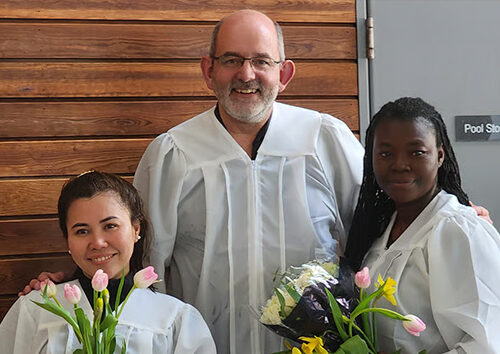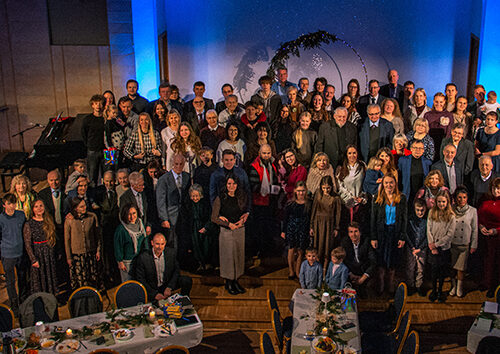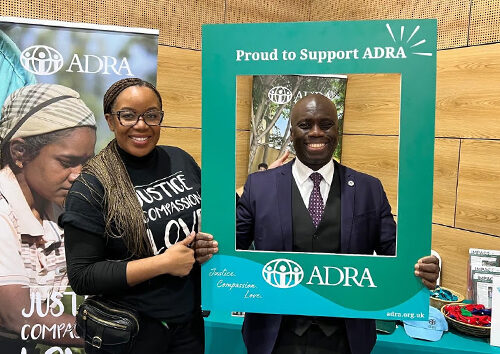14 October 2019 | Binfield, UK [Helen Pearson]
In an age where more than half the people in the world now have access to the internet,
what effect is the digital age having on our humanity? This was the question posed during the 2019 Beach Lecture at Newbold College of Higher Education on the evening of Tuesday, 8 October.
Graystone encouraged his audience to think not so much about the ingenuity of the technology but on the culture it creates – a culture which tends to ‘disembody’ people – creating different kinds of ‘avatar’. Different business enterprises – the bank, the electricity company, the shop – all are interested in different characteristics that don’t relate to the flesh and blood person that we are.
He described a major feature of being human in a digital age as the ‘collapse of context’. Unlike a physical object – a book, for instance – “digital information can travel across great distances and arrive in exactly the same condition in which it was sent. It can sit on a storage device for months or years, and when recalled it will appear exactly the same regardless of ownership, time or geography.”
Graystone suggested that the internet encourages the loss of distinction between a creator and what is created, between subject and object. We are all being easily manipulated by algorithms. And all of this dehumanising activity is carried on in a space where there are “huge commercial and political interests at play – interests that go far beyond the boundaries of geographical states.”
 The lecture then went on to a complex and fascinating discussion about what sort of humanity a highly functioning machine could be said to have. Graystone discussed the possibility of human beings plus machines creating a form of what could be called ‘posthumanity’. While highly conjectural it is still clearly on the near horizon of human development. The implications of dehumanisation in the light of God’s incarnation in Jesus Christ ‘who came “at the right time ” and to a physical place – the so-called ‘scandal of particularity’ are thought-provoking. The incarnation offers “a contrast to digital culture in which nothing is particular, and no atoms at any time have more significance than any other.”
The lecture then went on to a complex and fascinating discussion about what sort of humanity a highly functioning machine could be said to have. Graystone discussed the possibility of human beings plus machines creating a form of what could be called ‘posthumanity’. While highly conjectural it is still clearly on the near horizon of human development. The implications of dehumanisation in the light of God’s incarnation in Jesus Christ ‘who came “at the right time ” and to a physical place – the so-called ‘scandal of particularity’ are thought-provoking. The incarnation offers “a contrast to digital culture in which nothing is particular, and no atoms at any time have more significance than any other.”
The penultimate section of the lecture dealt with the practical and pastoral challenges to the church in the digital culture. “As our understanding of what is ‘real’ and what is virtual are shaken up by new technology, Christians will need to think about new ways of meeting, organising ourselves and communicating the gospel,” he said.
Graystone concluded with three challenging questions for church people:
- “How will a church that is constructed entirely around geography cope in an age when non-geographical communities are the norm?
- How will a church that is almost entirely driven by text communicate in an age when the symbol is king?
- What does the religion of the Incarnation have to say to a culture that relativises the human body?
“But the audience was left with more than questions. Graystone offered his own ‘seven principles for Christian engagement in the digital environment’”. They are worth listing in full:
Seven Principles for Christian Engagement in the Digital Environment
- Singularity of Personality
We should preach the singularity of personality as a goal in Christian holiness. Holiness requires that I won’t behave in one way in private and another in public – or behave online in ways that I wouldn’t behave off-line. I am one person, and the embodied me is the root of the genuine me, the me that God relates to. - Humanising digital relationships
We should seek continually to humanise the relationship between those who create content and those who consume it. We should challenge the notion that digital self-expression is an end in itself, reasserting the responsibility of the content–creator towards the consumer. This might be characterised as a digital equivalent of the ‘fair-trade’ movement. - Education
We should engage in a wide-spread process of ‘conscientisation’ that enables content-producers and consumers to understand the power-dynamics of the digital environment, and as much as possible to take control over their own presence in the digital environment. - Authority and openness
We should reject ‘pseudonimity’ and repudiate the doctrine that secrecy produces safety online. Instead we should ensure that every expression of our digital identity should be ‘signed’ so that it is traceable directly to our embodied reality. - Digital justice
We should guard against the pre-eminence of the identity of persons as consumers. In the political questions such as the availability of super-fast broadband or mobile access we should argue for preferential treatment for the poor, lest they become dehumanised by becoming objects in every digital relationship. - Mission and service
We should acknowledge that our ‘neighbours’ now include the 1.8 billion people who are online, and the 4.8 billion who are accessible to us by mobile phone, whilst not failing to remember the impact that the digital community has on the 2 billion or more who as yet have little or no access to it. - The priority of the embodied person
We should assert that those with whom we meet in embodied personhood – with whom we share houses, streets or bread and wine – will always remain our primary community.
Graystone’s full and highly recommended Beach Lecture 2019 can be seen on the Newbold College of Higher Education Facebook page.
Graystone has recently published a book on the subject of the lecture, Too Much Information? Ten Essential Questions for Digital Christians.
tedNEWS Staff: Victor Hulbert, editor; Deana Stojković, associate editor
119 St Peter’s Street, St Albans, Herts, AL1 3EY, England
E-mail: [email protected]
Website: www.ted.adventist.org
tedNEWS is an information bulletin issued by the communication department of the Seventh-day Adventist Church in the Trans-European Division. Readers are free to republish or share this article with appropriate credit including an active hyperlink to the original article.



